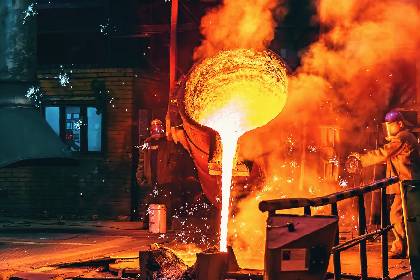The Organization for Economic Co-operation and Development (OECD) has warned that global steel overcapacity is set to exceed 680 million mt by the end of 2025, marking the fastest expansion since the 2009 financial crisis.
The announcement came after the 98th session of the OECD Steel Committee, held in Paris on November 4-5, 2025, which brought together 249 government officials and industry representatives from 43 delegations.
Committee vice-chairs Sheryl Groeneweg and Lieven Top urged coordinated global action, warning that non-market practices and subsidies are distorting competition, depressing prices and threatening industrial jobs.

Global demand weak but stabilizing
Delegates noted that after three years of contraction (2022-2024), global steel demand is stabilizing in 2025 and may recover by one percent in 2026, returning to 2022 levels.
While demand in China continues to decline sharply, India, ASEAN countries and other developing economies are expected to sustain growth, partially offsetting the downturn in developed markets.
Excess capacity expanding fastest in Asia and Middle East
According to the OECD, excess capacity could exceed 680 million mt by the end of 2025, with total steelmaking capacity projected to reach 2,547 million mt. An additional 109 million mt of new capacity could come online by 2028, mainly in Asia and the Middle East.
Despite China’s capacity-replacement rules, weak enforcement and overseas expansion by Chinese state-owned steelmakers, especially in ASEAN and Africa, continue to fuel the global surplus.
Trade distortions and export surge
The OECD warned that overcapacity is driving severe trade distortions:
- China’s steel exports hit a record 118 million mt in 2024 and have grown another 10 percent in 2025, putting downward pressure on prices.
- Chinese producers have shifted exports from finished to semi-finished products, exploiting regulatory loopholes and evading stricter trade measures.
- Asian, African and Latin American markets remain most vulnerable to displacement and predatory pricing.
Subsidies and non-market policies undermining fair competition
The Committee highlighted the proliferation of subsidies in China, MENA and the ASEAN region, including energy subsidies and tax exemptions, concessional loans and preferential procurement policies.
These measures sustain uncompetitive producers, crowd out private investment and distort market signals, undermining fair competition across market economies.
Decarbonisation at risk: 20 percent of low-carbon projects on hold
A key concern identified was the negative impact of market distortions on steel decarbonisation.
The OECD noted that one-fifth of planned low-emission steel projects (through 2027) are on hold, primarily due to profit margin erosion from overcapacity and falling prices.
This is slowing investments in hydrogen-based direct reduced iron (DRI), electric arc furnaces (EAFs), and carbon capture, usage and storage (CCUS) technologies, jeopardizing global carbon neutrality goals.
OECD calls for coordinated global response
The Steel Committee reaffirmed its support for joint multilateral action through the Global Forum on Steel Excess Capacity (GFSEC). Following the Ministerial Meeting on October 10, 2025, GFSEC members were tasked to develop a coordinated framework to tackle overcapacity by June 2026.
The Committee pledged to intensify monitoring of non-market interventions, evaluate trade-policy effectiveness and support market-oriented reforms to ensure fair competition and sustainable transformation.